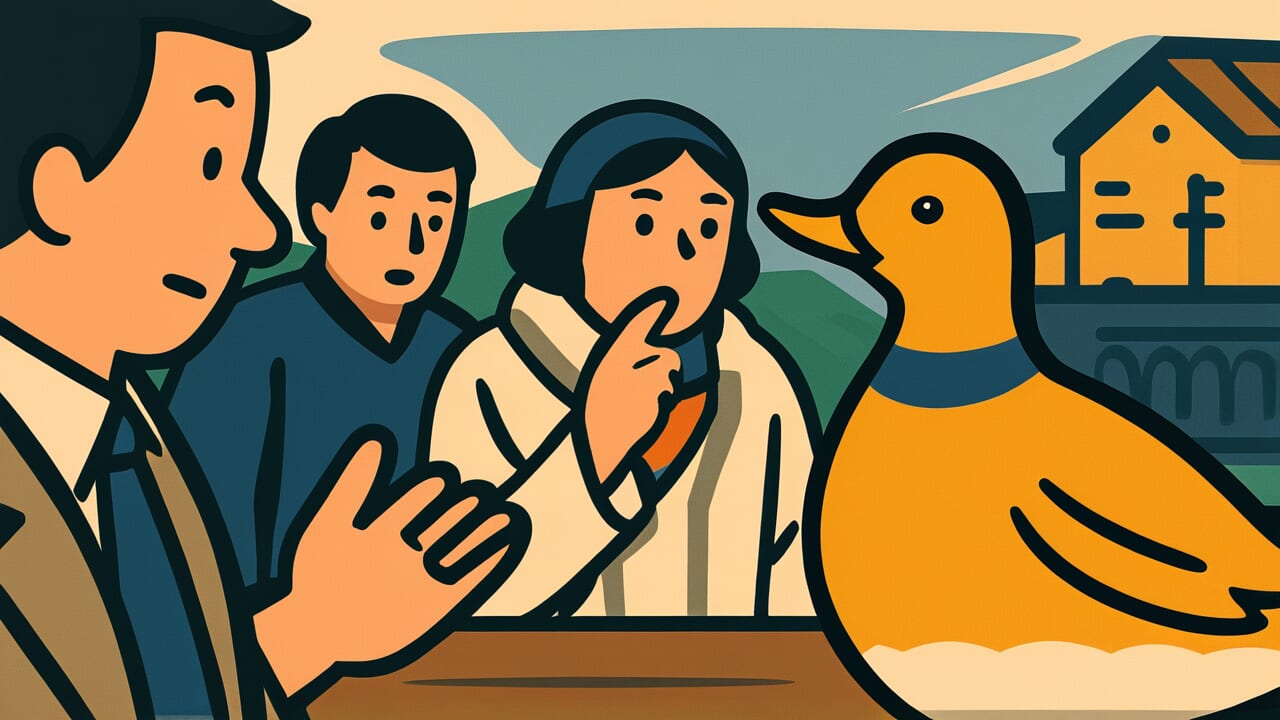How to Read “Slandering others is the taste of duck”
Hito o soshiru wa kamo no aji
Meaning of “Slandering others is the taste of duck”
This proverb points out a human tendency to enjoy criticizing and speaking ill of others, just like savoring delicious duck cuisine.
It warns that such words always bring misfortune, so we should avoid them.
Stories about other people’s failures, rumors, and critical topics somehow attract our interest. Conversations become lively, and we might even feel temporary solidarity or superiority.
However, this proverb warns us about the danger hidden in such behavior.
People use this saying when someone gets carried away gossiping, or when you’re about to say something critical yourself. It helps you practice self-control.
It’s also used to point out the danger when rumors and gossip spread. Once words leave your mouth, you can’t take them back.
This proverb teaches that those words will eventually come back to you.
Origin and Etymology
The exact source of this proverb is unclear, but we can learn interesting things from how the phrase is constructed.
Let’s focus on the expression “taste of duck.”
Duck has been a prized ingredient in Japan since ancient times. Winter duck, especially rich in fat, is considered delicious.
Duck hot pot and duck soba remain popular luxury dishes today. Edo period cookbooks featured many duck recipes.
For common people, duck was a special treat for important occasions. Its exceptional taste left a deep impression on people’s memories.
This proverb compares that “deliciousness of duck” to how people enjoy speaking ill of others.
It overlaps the satisfaction of eating delicious duck with the pleasure of gossiping and criticizing others.
When you think about it, people have always gathered at wells or over tea to talk about others.
The word “soshiru” means to speak badly of someone or criticize them.
This proverb warns of danger by comparing a negative human trait to something concrete like duck meat.
Just as delicious food has temptation, our ancestors understood that speaking ill of others has an irresistible appeal.
Usage Examples
- I noticed I’ve been criticizing people at work lately. Slandering others is the taste of duck, so I need to be careful.
- Those people always bond over someone’s gossip, but slandering others is the taste of duck—it’ll come back to them someday.
Universal Wisdom
Humans have a strange quality. Other people’s failures and flaws become topics of conversation more easily than their successes or happiness.
We find ourselves listening to such stories. Why is this?
One reason might be that talking about others’ flaws gives us the illusion of being relatively superior.
Also, having a common target of criticism creates solidarity among those present.
Furthermore, hearing about others’ failures can ease our own anxieties. It brings the comfort of “I’m not the only one.”
However, this proverb shows deep insight by comparing it to the delicious food of duck.
Delicious food brings temporary satisfaction, but eating too much makes you sick.
Similarly, slandering others may bring momentary pleasure, but long-term it destroys relationships, damages your reputation, and ultimately leads to isolation.
Throughout history and across cultures, conflicts through words never cease. This is because words have tremendous power.
They can hurt or heal. This proverb teaches us, gently yet firmly, not to misuse that power.
When AI Hears This
When you speak ill of others, your brain’s nucleus accumbens releases dopamine.
This is the same neural circuit activated when eating sweets or winning at gambling.
Why does gossip release dopamine? Because the brain mistakenly believes “my social status has relatively increased.”
By putting others down, even though you’ve accomplished nothing, your brain judges that you’ve “won the competition.”
What’s more interesting is that you develop tolerance to this pleasure. Like alcohol or drugs, the same stimulus stops satisfying you.
You start seeking stronger criticism and more extreme words.
People who repeatedly participate in online pile-ons aren’t weak-willed. They’re experiencing the neuroscientific structure of addiction itself.
Brain imaging research confirms that reward systems activate when seeing others fail.
This is called schadenfreude, and gossip is the act of actively creating it.
In other words, “the taste of duck” is a false reward signal created by the brain.
It’s a function originally needed for survival competition that’s now running wild in modern society.
People in the Edo period didn’t know neuroscience, yet they expressed this high addictiveness through the metaphor of “delicious” based on experience.
Lessons for Today
This proverb teaches us that how we choose our words determines our quality of life.
With social media development, anyone can easily express opinions now. But precisely because of this, we must not forget the weight of words.
When you feel like criticizing someone, pause for a moment. Are those words truly necessary?
It’s important to develop the ability to distinguish between constructive criticism and mere gossip.
If someone’s flaw bothers you, have the courage to tell them directly with compassion, rather than talking behind their back.
And when you find yourself in a situation where others are gossiping, you need the courage to change the subject.
By not going along, you preserve your own dignity.
Words are like seeds. If you plant seeds of criticism, criticism will eventually return to you.
But if you plant seeds of kindness, kindness will come back.
May your words become a force that encourages someone rather than hurts them.
That is the wish this proverb has entrusted to us.



Comments